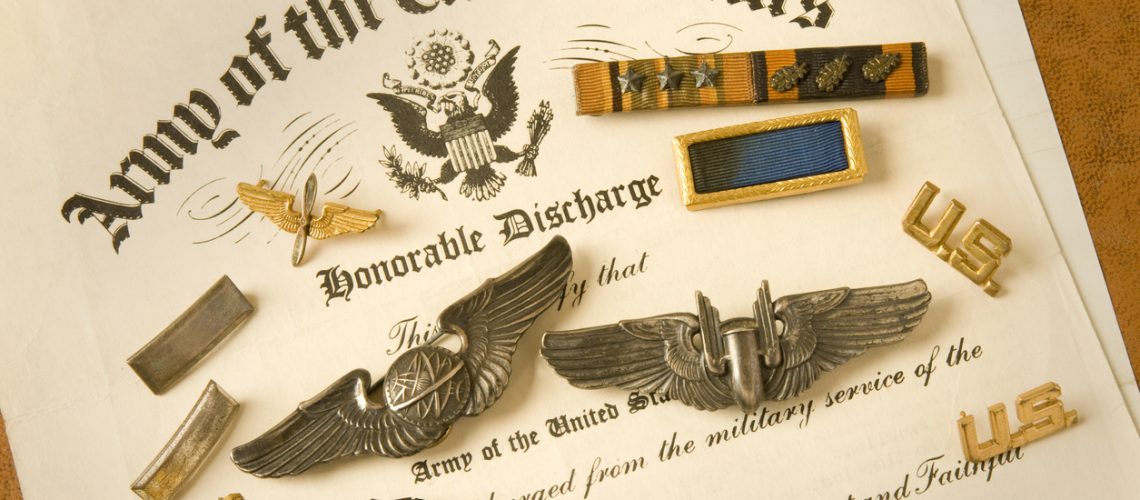When you leave the military, you will usually receive an honorable or dishonorable discharge. It can be quite confusing to understand the various types of military discharge. Here are 8 types to know.
1. Honorable Discharge
The most common type of military discharge is an honorable discharge. Honorable discharge demonstrates that you did not leave due to any crimes or bad conduct and have either completed your service or have a legitimate reason for not completing it. This may include medical retirement for issues such as PTSD, disability, or pregnancy. You are not required to go through the court system with an honorable discharge. Additionally, those with an honorable discharge are entitled to receive VA benefits, such as health insurance, a VA loan, and a pension.
2. General Discharge
While also a type of administrative discharge, a general discharge is different than an honorable discharge in that the servicemember may have some marks on their record. However, general discharges are not considered dishonorable. Rather, they are still given for honorable service. Depending upon why the general charge was given, the service member may be prohibited from reenlistment and may not receive GI Bill benefits.
3. Entry-Level Separation
Entry-level separation is a form of administrative discharge that is not considered either honorable or dishonorable. It is given to military members who leave the service within the first 180 days of joining. Military members may leave early like this due to an inability to keep up with basic training or a failure to meet military demands. Before the servicemember receives an entry-level separation, they must meet with their command and must receive a written notice that demonstrates that their command tried to solve the related issue before moving ahead with the separation. Often this is enough for the service member to fix the related issues.
4. Medical Discharge
Another military administrative discharge is a medical discharge, which is given for a variety of reasons that stem from an injury, disability, or other condition. Sometimes pre-existing conditions are made worse through military service or the illness or condition may be caused by the service. This requires a medical evaluation that finds the service member is no longer fit to serve. Members with this discharge can still usually apply for veteran disability benefits.
5. Other Than Honorable Discharge
An Other Than Honorable (OTH) discharge is an unfavorable administrative discharge. This is generally assigned when the service member fails to uphold the integrity of the military, such as a guilty finding of adultery. OTH discharges don’t require judicial action like dishonorable discharge does but are given to those who demonstrate negative behaviors. Those with an OTH discharge are usually ineligible for VA benefits.
6. Bad Conduct Discharge
One type of punitive discharge is a Bad Conduct Discharge (BCD). This involves the military justice system and is designated for those who show bad conduct but not as bad as those who receive a dishonorable discharge. Reasons for a BCD may include consistent failure to follow orders or alcohol abuse. This is a negative type of discharge that prevents the service member from receiving VA benefits.
7. Dishonorable Discharge
The punitive discharge with the most serious consequences is a dishonorable discharge. A service member will receive this type of discharge when they act in a way that completely goes against military rules. A dishonorable discharge stays as a permanent record and stems from a court-martial process. Reasons for a dishonorable discharge may include things such as rape and murder. A dishonorable discharge prevents the service member from receiving VA benefits or even owning or possessing firearms and ammunition. Additionally, a dishonorable discharge can show up on a background check, impacting everything from the veteran’s ability to find employment, to their ability to find housing. Those with a dishonorable discharge may be prevented from working for the government, receiving government assistance, obtaining a loan, or even being able to vote.
8. Dismissal (Officer Discharge)
An officer discharge is similar to a BCD or a dishonorable discharge in terms of a veteran’s ability to receive benefits. This discharge is for commissioned officers rather than non-officers. Officer discharges occur after the officer has been court-martialed.
The Court-Martial Law Division of Aviso Law LLC Helps Military Members in Colorado Who Have Been Charged with a Crime
It’s clear that the type of discharge a service member receives can have long-lasting effects on their life. If you believe that you have been wrongly discharged from the military, an attorney can help assist you and help you to determine what steps to take next. At the Court-Martial Law Division of Aviso Law LLC, we can help. We proudly serve our military members, who sacrifice so much for our country. To learn more or to schedule a free consultation, contact us today!


